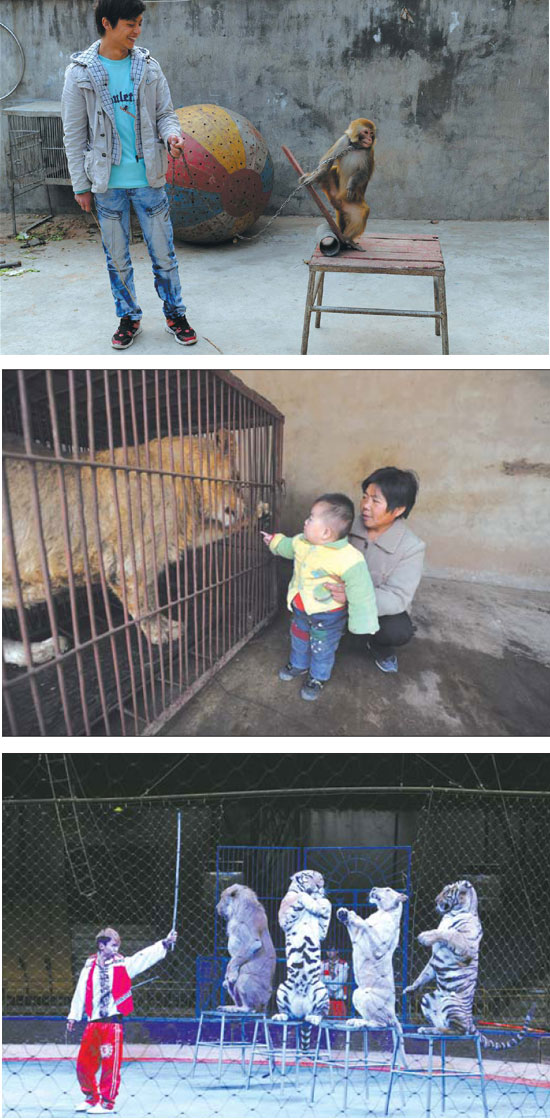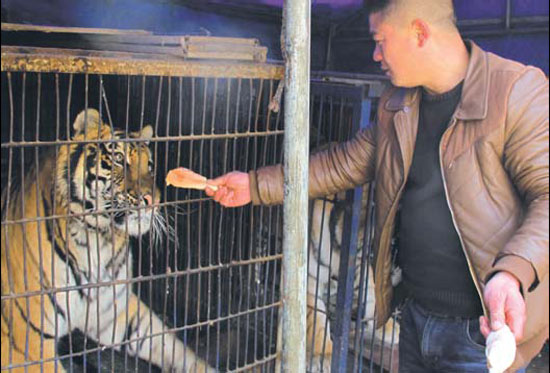Village of ringmasters
Updated: 2013-02-20 07:49
By Zhang Yue (China Daily)
|
||||||||
|
From top: A young villager trains a monkey at Haogou village in Suzhou, Anhui province. A grandmother and her grandson watch the lion caged in their family's backyard at the village. A Haogou circus stages animal performance. Photos by Wu Fang / For China Daily |
It is an unusual hamlet, where almost every house has a couple of tigers and lions in the backyard. Zhang Yue explores a village in Suzhou, Anhui province, where you don't have to run away from home to join the circus.
Last year's big screen blockbuster Life of Pi was all about a shipwrecked boy and how he floated on the sea stranded with a huge tiger.
In certain villages in Suzhou, Anhui province, living with tigers and lions is part of daily life.
Xu Changzhou, 41, of Haogou village in Yongqiao district in Suzhou, starts his day by feeding his four tigers, three lions, two monkeys and a sheep. Xu has done this for the last 15 years.
His backyard is no different from the average Chinese villager's, with piles of stuff covered under tarpaulin. But if you go nearer, you may hear the muted roars coming from under the waterproofed wraps. Unveil them and you'll see several lions and tigers staring out from their large cages.
"Watch out. Don't go too near," Xu warns strangers. The tigers, it seems, are wont to lift their legs and spray at unfamiliar visitors wandering too near their territory.
Like many households in his village, Xu's backyard houses a mini-zoo, and the 30-square-meter space is home to the animals when they are not touring the country, performing at southern provinces such as Yunnan, Guangdong and Hunan.
Ten days before the Lunar New Year, the village is quieter than usual, as most of the ringmasters have led their troupes away on tour during the Spring Festival.
It is a time-tested tradition for Haogou village, where the villagers have made a living out of training and performing with animals since the Ming (1368-1644) and Qing (1644-1911) dynasties.
It started with vagabonds wandering through the village with a monkey performing tricks and begging for money. Later, the repertoire expanded to include other animals and acrobatic stunts.
In 2006, the Chinese Acrobats Association gave formal recognition to Yongqiao district as the "home for Chinese circuses". But while this reputation grows, it also heralds complications.
Xu's family now lives in downtown Suzhou, and he earns a comfortable income of about 1 million yuan ($160,000) a year, but he says it is getting harder, and things are no longer as simple as it used to be.
Much of it comes from the public's growing awareness of animal rights and its perception of cruelty to animals.
"When the first annual international circus art festival was held in Suzhou in 2006, we tried to attract audiences with programs such as tigers and lions jumping through the rings of flames," says 58-year-old Zhang Yongheng, who has been working with circus performers for years.
"But this program was immediately canceled by the State Forestry Bureau, because animals are generally very afraid of fire."
Chao Yuezhan, a 31-year-old animal trainer from Henan province, is working with a troupe in Suzhou, taking care of and training three tigers, three lions and two bears. He and his elder brother have been doing this for over three years.
"We normally cooperate with zoos and parks where tourists gather and charge extra for the circus performance," Chao says. "But in 2011, some zoos stopped this because there was criticism from the public and animal protection groups."
"That was when our income was cut by about 20 percent," Xu recalls.
"Keeping all the animals costs about 40,000 yuan per month, and feeding them is about 300 yuan a day."
Xu, like every circus owner, keeps his animals well fed no matter how bad business is. If the animals get hungry, they get dangerous.
For Xu and other circus owners, the solution is to create new performances that can circumvent criticisms. And they get rewarded for their efforts.
The Yongqiao district government gives out subsidies that range from 30,000 to 50,000 yuan for innovative ringmasters who can create new circus acts that do not violate animal protection regulations.
Zheng Guowu, 59, is also from Haogou village, and he has made a reputation for himself as a trainer of small animals such as dogs and monkeys after 30 years working with the creatures.
He is still very passionate about his skills, but his son has refused to follow in his footsteps, saying this is something that "cannot feed the family".
This is another problem the "home of Chinese circus" is facing - few from the next generation are willing to take up the business.
"There were about 20,000 people working in circuses in Suzhou, but now the number has been greatly reduced," Zhang says.
"Part of the reason is that regulations for trading and training the animals are now more stringent and more complicated."
During the Spring Festival this year, Suzhou put up a three-day circus performance near its newly built railway station. It was a rare performance, because while the area is famous for its circus troupes, the locals seldom get to see them because they are off touring the rest of the country more often than not.
So why now?
"We want to motivate more young people to join the circus as professionals," Zhang says.
For the young people of Suzhou, they have to be persuaded to join the circus, and none, so far, had to run away from home as yet.
Contact the writer at zhangyue@chinadaily.com.cn.
|
Circus owner Xu Changzhou feeds his tiger with chicken. Zhang Yue / China Daily |
(China Daily 02/20/2013 page18)

 In Photos: 7.0-magnitude quake hits Sichuan
In Photos: 7.0-magnitude quake hits Sichuan
 Li Na on Time cover, makes influential 100 list
Li Na on Time cover, makes influential 100 list
 FBI releases photos of 2 Boston bombings suspects
FBI releases photos of 2 Boston bombings suspects
 World's wackiest hairstyles
World's wackiest hairstyles
 Sandstorms strike Northwest China
Sandstorms strike Northwest China
 Never-seen photos of Madonna on display
Never-seen photos of Madonna on display
 H7N9 outbreak linked to waterfowl migration
H7N9 outbreak linked to waterfowl migration
 Dozens feared dead in Texas plant blast
Dozens feared dead in Texas plant blast
Most Viewed
Editor's Picks

|

|

|

|

|

|
Today's Top News
Live report: 7.0-magnitude quake hits Sichuan, heavy casualties feared
Boston suspect cornered on boat
Cross-talk artist helps to spread the word
'Green' awareness levels drop in Beijing
Palace Museum spruces up
First couple on Time's list of most influential
H7N9 flu transmission studied
Trading channels 'need to broaden'
US Weekly

|

|









